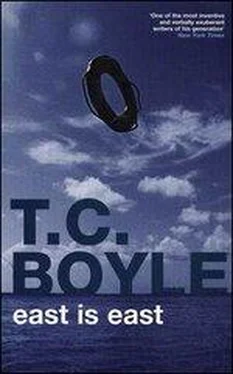Tom Boyle - East is East
Здесь есть возможность читать онлайн «Tom Boyle - East is East» весь текст электронной книги совершенно бесплатно (целиком полную версию без сокращений). В некоторых случаях можно слушать аудио, скачать через торрент в формате fb2 и присутствует краткое содержание. Жанр: Современная проза, на английском языке. Описание произведения, (предисловие) а так же отзывы посетителей доступны на портале библиотеки ЛибКат.
- Название:East is East
- Автор:
- Жанр:
- Год:неизвестен
- ISBN:нет данных
- Рейтинг книги:5 / 5. Голосов: 1
-
Избранное:Добавить в избранное
- Отзывы:
-
Ваша оценка:
- 100
- 1
- 2
- 3
- 4
- 5
East is East: краткое содержание, описание и аннотация
Предлагаем к чтению аннотацию, описание, краткое содержание или предисловие (зависит от того, что написал сам автор книги «East is East»). Если вы не нашли необходимую информацию о книге — напишите в комментариях, мы постараемся отыскать её.
, praised by
in
as "one of the most exciting young fiction writers in America," the result is a sexy, hilarious tragicomedy of thwarted expectations and mistaken identity, love, jealousy, and betrayal.
East is East — читать онлайн бесплатно полную книгу (весь текст) целиком
Ниже представлен текст книги, разбитый по страницам. Система сохранения места последней прочитанной страницы, позволяет с удобством читать онлайн бесплатно книгу «East is East», без необходимости каждый раз заново искать на чём Вы остановились. Поставьте закладку, и сможете в любой момент перейти на страницу, на которой закончили чтение.
Интервал:
Закладка:
They were approaching the Port of Savannah and Hiro knew he’d have to make his move soon. He’d read deeply in The Way of the Samurai for days, getting Mishima’s and Jōchō’s words by heart, and now he was ready. The book—in its plastic womb and with the odd little green bills and his father’s picture nestled safely between its leaves—clung to him with tentacles of black electrician’s tape, the tape his friend Ajioka-san had slipped him in the night. In his hands he held a stout oaken mop, its head soaked heavy with the water they’d given him for washing.
The footsteps, the weary, dragging, footsore steps of Noboru Kuroda, the slug who mopped up the officers’ quarters and served them at table, halted outside the door. Hiro stood back, envisioning the slumped shoulders and concave chest, the hopeless hands and perpetually bewildered expression of old “Just-a-Minute” Kuroda, as they called him behind his back, and he waited breathlessly as the key turned in the lock. In a sort of fever he watched as the handle rotated and the door pulled back, and then he charged, the mop thrust before him like a lance. It was over in an instant. Kuroda’s tired old jowls seized with surprise, the wet mop speared him in the solar plexus and he went down on the worn linoleum, gasping and floundering like a yellowfin jerked from the somnolent depths. Hiro was briefly sorry for the loss of the rice balls, which were now mashed into Kuroda’s shirt, but this was no time for regrets. He stepped nimbly over the wheezing old man and darted up the companionway, his feet quick, liberty pounding in his veins.
Below him, on the second deck, the crew was at lunch, puzzling over their plates and struggling to pluck the odd bit of sardine out of the mélange of hash, eggs and potatoes Chiba had inflicted on them. Above him was the superstructure, and its ascending decks: the ship’s office and main electrical and gyroscope rooms on the fourth deck; the radio room on the fifth; the captain’s cabin, where even now Captain Nishizawa lay in a sake -induced stupor, on the sixth; and, finally, the bridge. From the bridge, high-flown and airy, a pair of observation decks protruded, hanging out over the water on either side of the ship like extended wings. They were catwalks, actually, supported from beneath by steel struts, and from them you could see ten miles on a clear day. It was for these that Hiro was heading.
He rattled up the steps past the ship’s office and on up past the radio room and the captain’s cabin, moving quickly but with resolution. He wasn’t fleeing blindly, not at all: he had a plan, as Mishima, in his gloss on Jōchō, had advised. One may choose a course of action, Mishima said, but one may not always choose the time. The moment of decision looms in the distance and then overtakes you. Then is to live not to prepare for that moment of decision? It was. And he was prepared.
On up the steps he raced, past the chart room where Chief Mate Wakabayashi glared savagely at him and lurched out the door in pursuit, past the helm where Able Bodied Seaman Kuma stood fixed at the wheel, and out onto the port wingdeck, where OS Dorai gaped at his advancing form as if he’d never before seen a man moving upright on his own two legs. And then, with Wakabayashi raging behind him and Dorai immobile before him, Hiro paused to draw his penknife. Thoughts of all those American movies with their tattooed gangs and the feints and thrusts of their knife fights must have shot through Dorai’s head, and he stepped back a pace or two, but the knife wasn’t a weapon at all. It was a tool. In two quick strokes Hiro slashed the cord binding the white life ring to the rail, and while Wakabayashi thundered along the deck and Dorai cringed, Hiro became airborne.
It was a sixty-eight-foot drop from the bridge to the water, and from that height it seemed a hundred and sixty-eight. Hiro never hesitated. He fell into the empyrean like a skydiver running before the chute, like an eagle plunging from its aerie, but there was nothing to sustain him in that indifferent element, and the sea rushed up at him like a bed of concrete. He hit feet first, letting the life ring fly, and still the force of the concussion nearly ripped Jōchō from his body. By the time he bobbed to the surface, his lungs heaving for the sweet, sweet air, the Tokachi-maru had passed him by, sliding across the horizon like a liquid mountain.
Under full steam, it would take the ship nearly two miles and three and a half minutes to come to a full stop. She would come back for him, Hiro knew that, as he knew that even now all hands were scrambling across the decks shouting “Man overboard!,” but he also knew that the tightest turn she could make was almost a mile across. He stroked hard, his feet churning in the brine, arms hammering at the chop. He had no thought of heading west toward the distant shore—they’d expect that of him—but instead he watched the sun and pushed himself due south, the way they’d come.
The water was warm, tropical, gleaming with a thousand jewels. He watched the birds overhead, watched the clouds. He clung to the life ring and kicked his legs. And the sea sustained him, embraced him, wrapped him up like the arms of a long-lost father.
Thanatopsis House
Ruth had watched the storm gather all morning. It was so dark at 6:30 she nearly slept through her wake-up call, and she pulled on her shorts and top in the gloom. She came down for breakfast at 7:00, taking her place as usual at the silent table, and even then it seemed as if the night had never ended. Owen Birks-head, the colony’s director, had lit the lamps in the corners, but everything beyond the windows was flat and without definition. Inside, it was muggy and close, the air so thick you could almost pat it into place like a down comforter. There was no rumble of thunder, no flash of lightning or streak of rain, but she could feel the storm coming with a deep physical intuition that connected her with the newt beneath the rock and the spider drawn up in the funnel of its web. Of course, she couldn’t mention it to anyone, couldn’t say, “It feels like rain” or “We’re really in for it now.” No. She was, by choice, sitting at the silent table.
When Saxby’s mother, Septima, now in her early seventies and snoring raucously from the master suite behind the breakfast parlor, had set up the trust for Thanatopsis House on the death of her husband some twenty years earlier, she’d followed the lead of other, more established artists’ colonies like Yaddo, MacDowell and Cum-mington. One of the traditions she’d adopted—and particularly adhered to—was that of the silent table. At breakfast, it was thought, artists of a certain temperament required an absolute and meditative silence, broken only perhaps by the discreet tap of a demitasse spoon on the rim of a saucer—in order to make a fruitful transition from the realm of dreams to that exalted state in which the deep stuff of aesthetic response rises to the surface. Others, of course, needed just the opposite—conviviality, uproar, crippling gossip, lame jokes and a whiff of the sour morning breath of their fellow artists—to settle brains fevered by dreams of grandeur, conquest and the utter annihilation of their enemies. For them, Septima had provided the convivial table, located in a second parlor separated from the first by a paneled corridor and two swinging doors of dark and heavy oak.
Even on this morning, when the turmoil of the storm was building inside her, when she felt light, almost weightless, when she felt giddy and excited for no good reason, Ruth chose the silent table. She’d been at the colony two weeks now—fourteen mornings—and in that space of time she’d never, even for an instant, thought of sitting anywhere else. Aside from Irving Thalamus, whose trade-in-stock—urban Jewish angst—throve on confusion, the name artists, the serious ones, all chose the silent table. Laura Grobian sat here, and Peter Anserine, and a celebrated punk sculptress with staved-in eyes and skin so pale she looked three days dead. Ruth reveled in it. She pretended to read the Savannah paper—delivered on the previous afternoon’s ferry and always a day out of date—while she watched Laura Grobian, with her concave cheeks and haunted eyes—her famous haunted eyes—to see how she spooned up her cold cereal and how the unflagging hours of the night had treated her. Or she’d study Peter Anserine, recently divorced, with his long nose and prominent nostrils, as he hacked and snorted surreptitiously over his food and the book—always European, and never in translation—that seemed attached to him like some sort of growth. And, too, she got to see who was breakfasting with whom at the convivial table, as they had to pass through the silent room on their way. Ruth watched and brooded and plotted, and when it got to be too much, when the table was deserted and she could put it off no longer, she pushed herself up from her chair and walked the quarter mile to her studio in the woods. Saxby, of course, slept till twelve.
Читать дальшеИнтервал:
Закладка:
Похожие книги на «East is East»
Представляем Вашему вниманию похожие книги на «East is East» списком для выбора. Мы отобрали схожую по названию и смыслу литературу в надежде предоставить читателям больше вариантов отыскать новые, интересные, ещё непрочитанные произведения.
Обсуждение, отзывы о книге «East is East» и просто собственные мнения читателей. Оставьте ваши комментарии, напишите, что Вы думаете о произведении, его смысле или главных героях. Укажите что конкретно понравилось, а что нет, и почему Вы так считаете.











